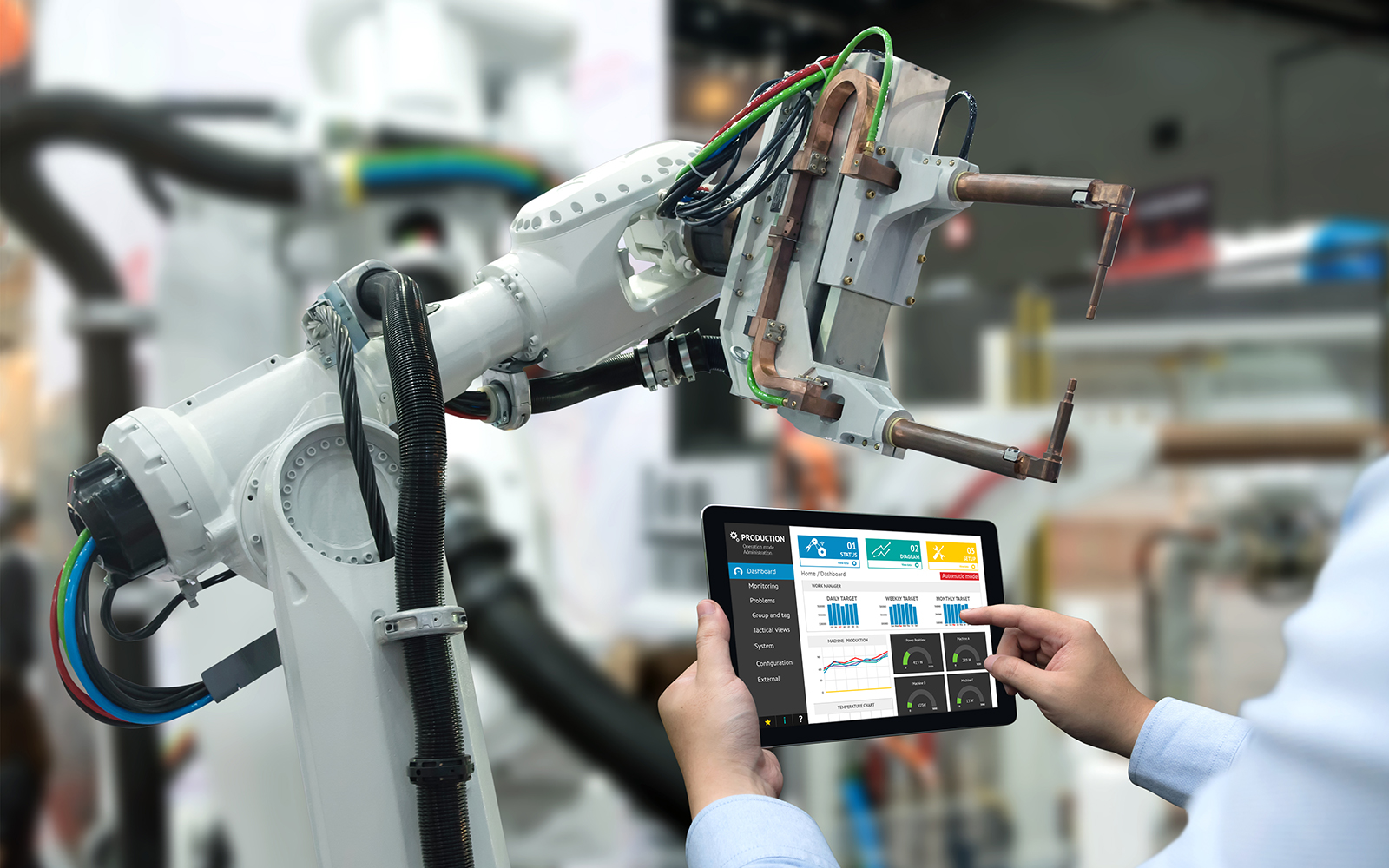
UConn’s MEM Program Gives Students Unique Mix of Business, Engineering Skills for Technology Revolution
In just the past seven or so years, the world of manufacturing has inaugurated the next phase of its own evolution with a new set of guiding principles known as “Industry 4.0.” Just as the transitions from the Stone Age to the Bronze Age to the Iron Age marked periods of radical, sweeping advances for the human species, Industry 4.0 marks the next, drastically different epoch of production technology.
The first phase in this arc of history was the Industrial Revolution. Laboring artisans gave way to factories, in which the driving technological innovations were the use of water mills and steam power to drive heavy equipment. In the early 20th century the second phase came with Henry Ford’s assembly line, allowing for the incredible efficiency of mass production. The Second World War served to amplify the speed of change in this era, with the focus of the war effort spurring intellectual advances toward greater and greater efficiency in human systems.
‘Intellectual’ Manufacturing Led to Satellites, Smartphones and More
But then in the third phase of our industrial journey, production technology had nowhere to go but to transcend human limitations. In the late 20th century, operations at the most advanced factories became automated and controlled by computers. Computer-numerical-controlled (CNC) machines could now produce parts at a level of precision unachievable by human hand.
Manufacturing became more intellectual in the process; engineers could focus on computer-aided design (CAD), and integrating new scientific methods and materials, confident that computerized systems could now execute their designs with the required precision to make seemingly anything possible. This revolution gave us the world we know today, full of jet airplanes, satellite communications, and smartphones.
The Next Frontier: Artificial Intelligence in Manufacturing
So what could be next? German thought leaders dubbed the next step Industry 4.0, and by 2013 its guiding principles were starting to take shape. Heavily connected to the concept of IoT (the Internet of Things) the future will bring more and more machines that seem to think for themselves and communicate with each other, tracking physical movements via sensors and taking corrective action, and even predicting the need for maintenance.
Where the automation revolution of the past century used machines as obedient dummies, mindlessly executing a program of simple commands in sequence, the next phase of automation will incorporate artificial intelligence, with machines that measure and analyze performance, synthesizing data to observe trends and make recommendations.
UConn Program Strives to Develop Leaders with High-Tech Competency
And who will be the next generation of leaders in this new era of production?
UConn’s Management and Engineering for Manufacturing (MEM) Program delivers a uniquely broad education in business and engineering, designed to develop the leadership and technical skills to do just that. Students need training with rigor, through courses like thermodynamics, differential equations, and materials science, giving them the ability to communicate competently in enterprises with a high-tech core competency. They also need to communicate in the languages of finance and accounting, understand how to motivate and organize fellow workers, and formulate long-term strategy.
The leaders of tomorrow will need the core skills of both business and engineering. Aside from UConn, there is no other undergraduate program in the country with such strong support from both a School of Business and a School of Engineering. Our MEM program is unique in this regard, and student enrollments have more than tripled in the past four years, reflecting the increased demand for the skill set we offer. In 2016, MEM students reported a higher median starting salary than any other School of Business major.
New Production is ‘Icing on Cake’ for Advanced Industry, Like Aerospace Sector
What is deceptive about the “Industry 4.0” title is that it sounds like the next generation of a new piece of software that would immediately make its predecessor obsolete. On the contrary, the 4.0 efforts are the new icing on the cake for the world’s most advanced industries, like many of Connecticut’s high-tech firms in the aerospace sector. But old-school, non-automated production will continue to exist for years to come. Industry 4.0 is the gold standard for a company that has successfully reached the mountaintop of automated production, but many industries and firms still have a long way to go to get there.
So in addition to the broad education in engineering and business fundamentals, the MEM program also delivers an in-depth dive into the myriad production systems in today’s business eco-system. The UConn Operations and Information Management and Mechanical Engineering departments, which co-founded the program, help deliver specialty courses in manufacturing automation and computers in manufacturing. We teach statistical quality control and design of machine elements.
Additionally, some of our newest efforts in the past few years have enhanced the breadth of our engineering offerings, with a new course in robotics and a revamped advanced products and processes course with a deeper view of production in chemical engineering and electrical engineering, to name a few.
All of this culminates in senior design, in which MEM students get a unique experience in solving engineering process-improvement problems in a real-world business context. MEM students can put all the pieces together and see the big picture, and they can dig into the details: measuring, designing, and improving a system from all angles, including cost analysis, value-add, and accountability.
The Industry 4.0 buzz around the manufacturing community gives much to be excited about on the horizon. Through MEM, we’re developing the talent of tomorrow to lead the way.
Professors Robert Day and Jiong Tang are co-directors of the Management and Engineering for Manufacturing (MEM) Program. Established in 1990, the program’s graduates earn a bachelor of science degree conferred jointly from the School of Business and the School of Engineering. Day will also serve as Associate Dean for Undergraduate Programs in the UConn School of Business starting in Fall 2017.